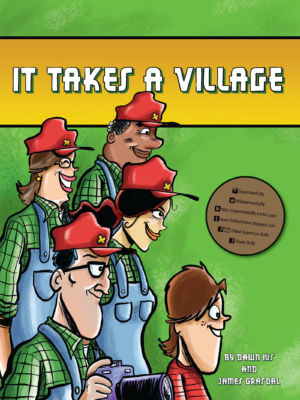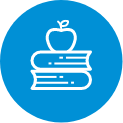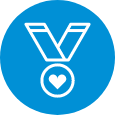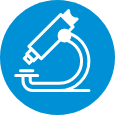
Grade 4 Learning Objectives for “It Takes a Village”
Jump to Subject

English Language Arts
General Learning Objective
1. Students will listen, speak, read, write, view and represent to explore thoughts, ideas, feelings and experiences
Specific Learning Objectives
1.1. Discover and Explore
Express ideas and develop understanding
- Compare new ideas, information and experiences to prior knowledge and experiences
- Ask questions, paraphrase and discuss to explore ideas and understand new concepts
- Share personal responses to explore and develop understanding of oral, print and other media texts
Experiment with language and forms
- Discuss and compare the ways similar topics are developed in different forms of oral, print and other media texts
1.2 Clarify and Extend
Consider the ideas of others
- Identify other perspectives by exploring a variety of ideas, opinions, responses and oral, print and other media texts
Combine ideas
- Use talk, notes, personal writing and representing to record and reflect on ideas, information and experiences
General Learning Objective
2. Students will listen, speak, read, write, view and represent to comprehend and respond personally and critically to oral, print and other media texts.
Specific Learning Objectives
2.1 Use Strategies and Cues
Use prior knowledge
- Use ideas and concepts, developed through personal interests, experiences and discussion, to understand new ideas and information
- Explain how the organizational structure of oral, print and other media texts can assist in constructing and confirming meaning
Use comprehension strategies
- Comprehend new ideas and information by responding personally and discussing ideas with others
- Monitor understanding by confirming or revising inferences and predictions based on information in text
Use textual cues
- Distinguish differences in the structural elements of texts, such as letters and storybooks, to access and comprehend ideas and information
Use phonics and structural analysis
- Identify and know the meaning of some frequently used prefixes and suffixes
- Apply knowledge of root words, compound words, syllabication, contractions and complex word families to read unfamiliar words in context
- Integrate knowledge of phonics and sight vocabulary with knowledge of language and context clues to read unfamiliar words in context
2.2 Respond to Texts
Experience various texts
- Experience oral, print and other media texts from a variety of cultural traditions and genres, such as personal narratives, plays, novels, video programs, adventure stories, folk tales, informational texts, mysteries, poetry and CDROM programs
- Discuss a variety of oral, print or other media texts by the same author, illustrator, storyteller or filmmaker
- Retell events of stories in another form or medium
- Make general evaluative statements about oral, print and other media texts
Construct meaning from texts
- Connect the thoughts and actions of characters portrayed in oral, print and other media texts to personal and classroom experiences
- Identify the main events in oral, print and other media texts; explain their causes, and describe how they influence subsequent events
- Compare similar oral, print and other media texts and express preferences, using evidence from personal experiences and the texts
- Develop own opinions based on ideas encountered in oral, print and other media texts
Appreciate the artistry of texts
- Explain how language and visuals work together to communicate meaning and enhance effect
2.3 Understand Forms, Elements and Techniques
Understand forms and genres
- Describe and compare the main characteristics of a variety of oral, print and other media texts
Understand techniques and elements
- Identify and explain connections among events, setting and main characters in oral, print and other media texts
General Learning Objective
3. Students will listen, speak, read, write, view and represent to manage ideas and information.
Specific Learning Objectives
3.2 Select and Process
Access information
- Identify information sources that inform, persuade or entertain, and use such sources appropriately
Evaluate sources
- Recall important points, and make and revise predictions regarding upcoming information
3.3 Organize, Record and Evaluate
Organize information
- Organize ideas and information, using appropriate categories, chronological order, cause and effect, or posing and answering questions
- Organize oral, print and other media texts into sections that relate to and develop the topic
Record information
- Paraphrase information from oral, print and other media sources
Evaluate information
- Examine gathered information to identify if more information is required; review new understanding
General Learning Objective
4. Students will listen, speak, read, write, view and represent to enhance the clarity and artistry of communication.
Specific Learning Objectives
4.3 Present and Share
Demonstrate attentive listening and viewing
- Connect own ideas, opinions and experiences to those communicated in oral and visual presentations
- Give constructive feedback, ask relevant questions, and express related opinions in response to oral and visual presentations
General Learning Objective
5. Students will listen, speak, read, write, view and represent to respect, support and collaborate with others.
Specific Learning Objectives
5.1 Respect Others and Strengthen Community
Appreciate diversity
- Describe similarities and differences between personal experiences and the experiences of people or characters from various cultures portrayed in oral, print and other media texts
Relate texts to culture
- Identify and discuss main characters, plots, settings and illustrations in oral, print and other media texts from diverse cultures and communities

Health
Topic: Learning Strategies
General Learning Objective
Life Learning Choices
Students will use resources effectively to manage and explore life roles and career opportunities and challenges.
Specific Learning Objectives
L–4.2
- Identify ways individuals continue to learn throughout their lives
Topic: Life Roles and Career Development
General Learning Objective
Life Learning Choices
Students will use resources effectively to manage and explore life roles and career opportunities and challenges.
Specific Learning Objectives
L–4.5
- Relate personal interests to various occupations
L–4.6
- Recognize that personal roles will change over time and circumstances

Science
General Learning Objective
4–4 Demonstrate positive attitudes for the study of science and for the application of science in responsible ways.
Specific Learning Objectives
Students will show growth in acquiring and applying the following traits:
- Curiosity
- Confidence in personal ability to explore materials and learn by direct study
- A willingness to work with others in shared activities and in sharing of experiences
- Appreciation of the benefits gained from shared effort and cooperation
- Respect for living things and environments, and commitment for their care.

Social Studies
Topic: 4.3 Alberta: Celebrations and Challenges
General Learning Objective
Students will demonstrate an understanding and appreciation of how Alberta has grown and changed culturally, economically and socially since 1905.
Specific Learning Objectives
4.3.2
Assess, critically, the challenges and opportunities that Alberta has faced in its growth and development by exploring and reflecting upon the following questions and issues:
4.3.3
Examine, critically, Alberta’s changing cultural and social dynamics by exploring and
reflecting upon the following questions and issues: